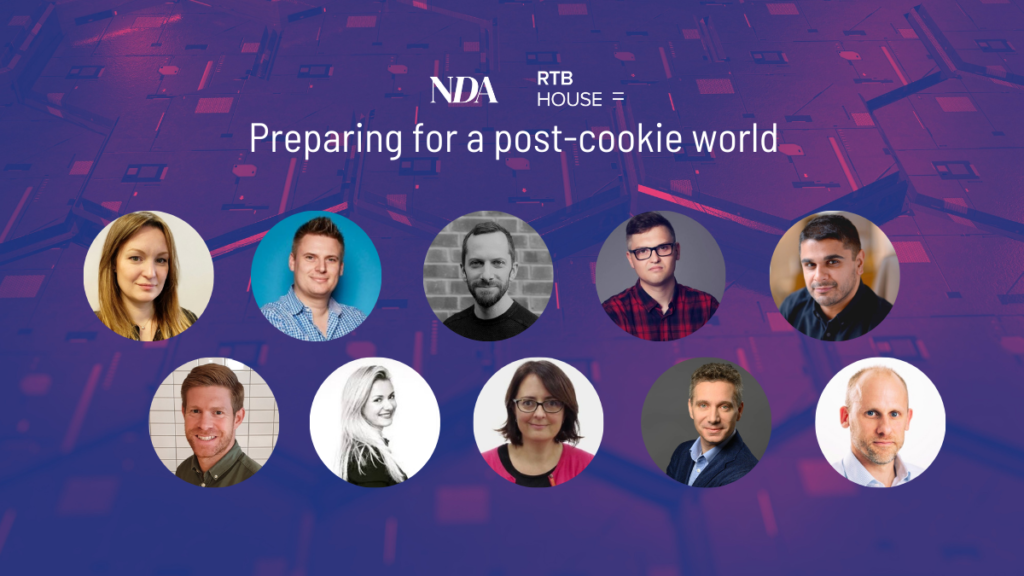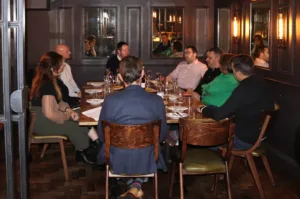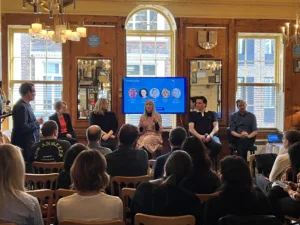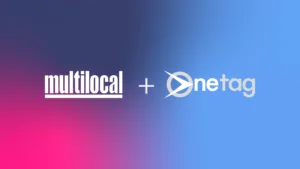The advertising industry has been discussing the deprecation of third-party cookies on Chrome for the past three years and, with every subsequent delay or update by Google, the debate flares up again. New Digital Age (NDA), in partnership RTB House, assembled a panel of industry experts from across the digital advertising ecosystem to capture their latest thoughts on the ongoing transition to a cookieless future.
NDA’s editor-in-chief Justin Pearse, hosted the panel where he was joined by Jo Holdaway, CDMO for Independent Digital News and Media ( IDNML); Piers North, CRO, Reach Plc; Olya Dyachuk, Data Driven Media Director, Heineken; Paul Bland, Head of Biddable Media, Havas Media Group UK; Nav Dhillon, Head of Advertising, Gumtree; Clare Ritchie, Global Head Of Programmatic, Mediacom; Tim Lawrence, Senior Director Digital, Data and Technology, Starcom; Kevin Joyner, Director of Data Strategy, Croud; plus Łukasz Włodarczyk, VP of Programmatic Ecosystem Growth & Innovation, and Simon Trewavas, Country Manager, UKI, both of RTB House.
Given that the debate has already been running for years and that Google’s final deadline keeps on slipping, the first question asked of our panel was whether, when it finally happens, the deprecation of cookies will still matter to the advertising industry – or will things have already moved on?
MediaCom’s Clare Ritchie opened up the discussion by noting that the digital ad sector has already been undergoing its ‘cookieless’ evolution for some time. She said: “There are already huge parts of the advertising opportunity that are not dependent on third-party cookies, but it will still matter when we lose them. Ultimately, the situation is forcing positive change, transparency and responsibility on the ad industry.”
Getting ready
Dyachuck of Heineken believes that the loss of third-party cookies will matter for anyone “close to the reality of data driven activation”. She explained: “How do you find the right people if you don’t have data? I don’t think the issue for marketers is just about finding the right tools to replace the functionality of cookies. It’s also looking into the broader comms paradigm and understanding what is the role of media and asking what sorts of data do we really need? We’ve seen a shift towards consumer experience communications having greater value and that is a good thing.”
IDNML’ s Jo Holdaway is more concerned that many across the advertising ecosystem are still underprepared for the ultimate demise of third-party cookies. She commented: “Whenever it happens, I don’t think many people are going to be ready for it, to be honest. I’m not seeing much evidence of testing in the marketplace. Culturally, particularly on the publisher side, it’s quite a battle to get people to focus on this sort of thing. We are well prepared in terms of first party data acquisition and we’re testing new ways of trading, but we’ve not made as much progress as I’d like in other areas, such as auditing our tech stack partners for the future. Not all partners have declared their intentions yet for evaluation”
Fellow publisher North revealed that Chrome is still a massive part of Reach’s digital ad business, probably in the region of 65% of its inventory. He said: “No publisher can afford to not work with Google AdX in my view, so we need to keep up with whatever they do next. We’ve had announcements so far from Google on FLoC, Fledge and now Topics and we’ll continue to track the latest ideas being floated. We’ve been getting our first-party data into shape for the past couple of years, and we have also been developing Mantis, our contextual and sentiment tool, alongside other publishers. The most important thing for me is that, post third-party cookie, the plurality of media continues, rather than advertisers simply consolidating around the major platforms and the user data they offer.”
Measure for measure
Croud’s Kevin Joyner believes the single biggest impact of third–party cookie deprecation will be on the measurement of campaign performance. He said: “We hear so much about first-party data and alternative methods of targeting, but we shouldn’t forget about measurement and attribution. Measurement is always going to be something that we need to do effectively as an industry and digital advertising has depended on cross-site tracking and cross-device addressable tracking for a long time. My concern is that this could lead to advertisers consolidating their budgets with the big established platforms like YouTube and Google. Digital agencies will need to learn new ways of measuring their campaigns. TV and brand advertising people may be familiar with KPIs like time series and type analysis but most people from a digital background don’t have a clue about that sort of modeling.”
Trewavas of RTB House added: “Someone once told me that, in advertising, measurement is all about trying to be ‘less wrong’. The deprecation of third-party cookies represents a really interesting moment for the industry and a great opportunity for us to become less wrong about the assumptions we’ve been making about campaign measurement.”
Nav Dhillon of Gumtree pointed out that one of the main issues with Google’s recently proposed Topics API is in relation to attribution. He said: “From a publisher standpoint, we have 30% of our traffic on app, around 30% on Chrome and the rest split between Safari and Mozilla, but the vast majority of our revenue is still transacted in Chrome. That’s where the buying bucks are and people will always want to see ROI on their investment in media. We can find all sorts of solutions to deliver the right impression to the right user and publishers have a wealth of data to leverage, but that won’t help marketers show the value of their campaigns to their bosses. When we first heard about FLoC, there was much more interest around stuff like clean rooms, but the money just isn’t flowing through those pipes at the moment.”
Going off Topics?
RTB House’s Włodarczyk believes marketers should prepare for the cookieless future by having a strategy for activating advertisers’ or publishers’ first party data and, also, some working prototypes prepared for the future browser-side marketing APIs, such as those proposed by Google with their Fledge or Topics API.
On the subject of Google’s latest proposal, he said: “Right now, I see the Topics API as more of a discussion starter by the Chrome team rather than a concrete proposal ready for testing core integration. There are still a lot of open questions around the mechanics and utility of the solution. For example, who will be responsible for assigning users to the Topics? What about publisher input? Will they have any say in setting their own Topics?
“The Topics proposal uses basic web browsing data based on top level domains, which reminds me how contextual advertising looked 15 years ago. Let’s not go backwards. Contextual advertising could be a really powerful tool for advertisers in 2022 and beyond, as long as it’s based on innovative technology such as Deep Learning.”
Paul Bland of Havas Media Group believes that Topics seems like a “sound technical solution” that balances consumer privacy with advertisers’ need for data to target their campaigns, but argues that there are still big issues to overcome with the proposal. He said: “Chrome accounts for roughly half of the browser market, so what will the others do? Will they adopt Topics? Probably not, which will obviously lead to more fragmentation and more complexity for brands and their agencies. Likewise, will larger publishers get behind it or will they prefer to back alternative solutions of their own?”
Ritchie added her perspective, saying: “The proposal has some real strengths. It achieves a greater level of privacy from the consumer perspective and, for publishers, it should allow monetization of sites that may not otherwise be considered contextually relevant by advertisers. However, when considered from a measurement perspective, or a client perspective, there are certainly issues in terms of wastage, latency, and accuracy of targeting.”
Starcom’s Tim Lawrence believes that, for the moment, marketers will need to continue to hedge their bets as to the shape of the cookieless future. He said: “It feels like there are still a lot of runners and riders, and we’re going to see quite a few iterations of proposals like Topics before the dust settles. We work with a range of advertisers with a variety of decision-making processes and paths to purchase, so Topics is not ideal as it stands. Above all, as marketers, we need scale and we need accuracy, so we’ll keep exploring any solution that has the potential to deliver those things.”









